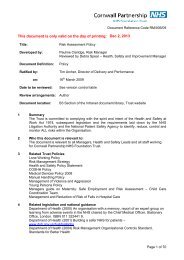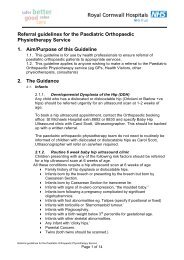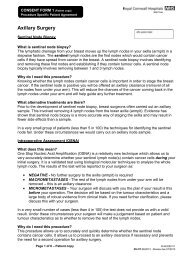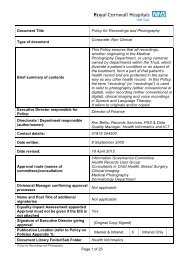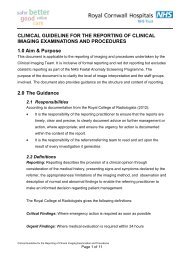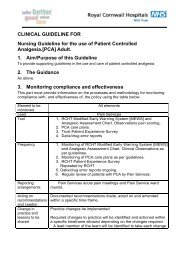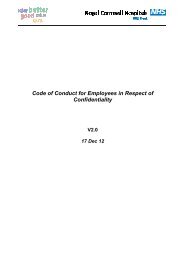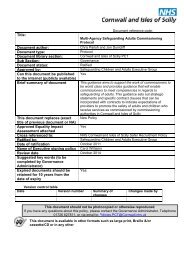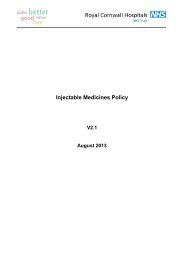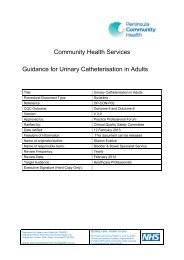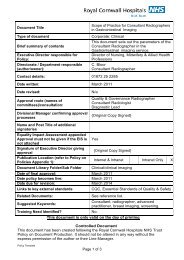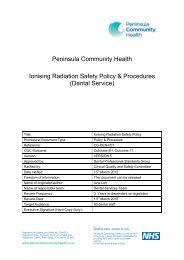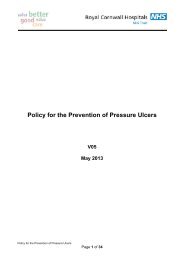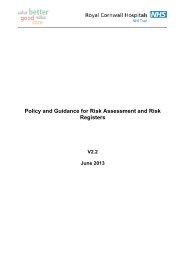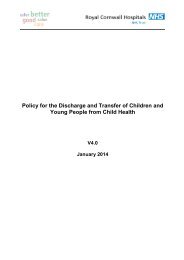Meeting The Spiritual and Religious Needs of Staff, Patients, Visitors ...
Meeting The Spiritual and Religious Needs of Staff, Patients, Visitors ...
Meeting The Spiritual and Religious Needs of Staff, Patients, Visitors ...
Create successful ePaper yourself
Turn your PDF publications into a flip-book with our unique Google optimized e-Paper software.
Peninsula Community Health<br />
<strong>Meeting</strong> <strong>The</strong> <strong>Spiritual</strong> <strong>and</strong> <strong>Religious</strong> <strong>Needs</strong> <strong>of</strong><br />
<strong>Staff</strong>, <strong>Patients</strong>, <strong>Visitors</strong> <strong>and</strong> Carers in Community<br />
Hospitals<br />
Title:<br />
<strong>Meeting</strong> <strong>The</strong> <strong>Spiritual</strong> <strong>and</strong> <strong>Religious</strong> <strong>Needs</strong> <strong>of</strong><br />
<strong>Staff</strong>, <strong>Patients</strong>, <strong>Visitors</strong> <strong>and</strong> Carers in<br />
Community Hospitals<br />
Procedural Document Type:<br />
Policy<br />
Reference:<br />
COP4<br />
Version: V3 August 2011<br />
Ratified by:<br />
CIOS Community Health Services Board<br />
Date ratified: 29 th September 2011<br />
Freedom <strong>of</strong> Information:<br />
This document can be released<br />
Name <strong>of</strong> originator/author:<br />
Mark Richards (originally developed by Peter<br />
Knibbs<br />
Name <strong>of</strong> responsible team:<br />
Chaplaincy<br />
Review Frequency:<br />
3 Years<br />
Review date: 29 th September 2014<br />
Target audience:<br />
All staff, patients <strong>and</strong> visitors in Community<br />
Hospitals<br />
Exec Signature (Hard Copy Only):<br />
Registered in Engl<strong>and</strong> <strong>and</strong> Wales No: 7564579<br />
Registered <strong>of</strong>fice: Peninsula Community Health CIC,<br />
Sedgemoor Centre, Priory Road, St Austell PL25 5AS<br />
www.peninsulacommunityhealth.co.uk<br />
Quality care, closer to you<br />
Peninsula Community Health is a not for pr<strong>of</strong>it<br />
Community Interest Company responsible for<br />
providing NHS adult community health services<br />
in Cornwall <strong>and</strong> the Isles <strong>of</strong> Scilly
<strong>Meeting</strong> <strong>Spiritual</strong> <strong>and</strong> <strong>Religious</strong> <strong>Needs</strong><br />
Contents<br />
CONTEXT AND SERVICE FRAMEWORK ................................................................ 3<br />
1 Introduction ........................................................................................................ 3<br />
2 Definitions .......................................................................................................... 3<br />
3 <strong>The</strong> Chaplaincy Service ..................................................................................... 4<br />
3.1 Recruitment / Volunteers ............................................................................. 4<br />
3.2 Availability.................................................................................................... 4<br />
3.3 Arrangements .............................................................................................. 5<br />
3.4 Storage <strong>of</strong> Artefacts <strong>and</strong> Symbols................................................................ 5<br />
3.5 Recording..................................................................................................... 5<br />
3.6 Bereavement Services................................................................................. 5<br />
3.7 Emergency <strong>and</strong> Major Incident .................................................................... 5<br />
3.8 Complaints................................................................................................... 5<br />
4 Duties................................................................................................................. 5<br />
5 Confidentiality <strong>and</strong> Data Protection .................................................................... 7<br />
6 Risk Management Strategy Implementation....................................................... 7<br />
6.1 Implementation ............................................................................................ 7<br />
6.2 Training <strong>and</strong> Support ................................................................................... 7<br />
6.3 Dissemination .............................................................................................. 8<br />
6.4 Storing the Procedural Document ................................................................ 8<br />
6.5 Equality Impact Assessment........................................................................ 8<br />
7 Process for Monitoring Effective Implementation ............................................... 8<br />
8 Associated Documentation & References.......................................................... 9<br />
9 Appendix 1 - CENSUS DATA........................................................................... 10<br />
Please Note the Intention <strong>of</strong> this Document<br />
<strong>The</strong> aim <strong>of</strong> this policy is to meet the needs <strong>of</strong> today’s multi-cultural <strong>and</strong> diverse society by<br />
respecting <strong>and</strong> supporting the spiritual, religious <strong>and</strong> cultural needs <strong>of</strong> staff, patients, carers<br />
<strong>and</strong> visitors, including people who do not identify with a particular religion or belief, during<br />
their contact with Peninsula Community Health.<br />
V1-3 Page 2 <strong>of</strong> 10 22-Aug-12
<strong>Meeting</strong> <strong>Spiritual</strong> <strong>and</strong> <strong>Religious</strong> <strong>Needs</strong><br />
CONTEXT AND SERVICE FRAMEWORK<br />
<strong>The</strong> Department <strong>of</strong> Health is committed through the NHS Plan to support delivery <strong>of</strong> NHS<br />
services that put patients at the heart <strong>of</strong> everything they do. This includes having a<br />
chaplaincy service in the community hospitals that meets the needs <strong>of</strong> the people who come<br />
into contact with it. This commitment is supported by the following documents the<br />
information in which has been taken into account when developing this policy:<br />
<strong>The</strong> Human Rights Act 1998 Article 9, introduced in October 2000, enshrines in law the right<br />
<strong>of</strong> the individual to religious observance.<br />
NHS Chaplaincy 2003<br />
Caring for the Spirit 2003<br />
Code <strong>of</strong> Conduct for Healthcare Chaplains 2006<br />
CQC Essential St<strong>and</strong>ards<br />
Improving Working Lives<br />
St<strong>and</strong>ards for <strong>Spiritual</strong> Healthcare 2010<br />
“<strong>Meeting</strong> the varied spiritual needs <strong>of</strong> patients, staff <strong>and</strong> visitors is fundamental to the care<br />
the NHS provides”<br />
1 Introduction<br />
(NHS Chaplaincy: November 2003)<br />
Peninsula Community Health (PCH) recognises that health, well being <strong>and</strong> happiness are<br />
reliant on both physical <strong>and</strong> psychological needs being met. Most people, at some point in<br />
their lives, needs support. This is particularly true in time <strong>of</strong> uncertainty, loneliness, stress,<br />
illness, guilt or death. This policy has been developed to make arrangements to enable<br />
where possible, the spiritual, pastoral, religious <strong>and</strong> cultural requirements <strong>of</strong> all staff,<br />
patients, carers <strong>and</strong> visitors, whatever their belief, to be met.<br />
<strong>The</strong> organisation is committed to working in collaboration with others, including health <strong>and</strong><br />
social care partners from the statutory, community <strong>and</strong> voluntary sectors, to develop a<br />
service that meets the needs <strong>of</strong> all who come into contact with it. PCH will engage in honest<br />
<strong>and</strong> open discussion, <strong>and</strong> actively listen to the views <strong>of</strong> others, to ensure that a relationship<br />
<strong>of</strong> trust grows in order to support <strong>and</strong> encourage the development <strong>of</strong> the service. All<br />
Managers will be accessible to Hospital Chaplains in order to discuss any aspect <strong>of</strong> the<br />
service or its delivery.<br />
PCH will encourage individuals to underst<strong>and</strong>, respect <strong>and</strong> value diverse religious <strong>and</strong><br />
spiritual behaviours <strong>and</strong> to eliminate discrimination.<br />
2 Definitions<br />
Chaplain - All spiritual care givers<br />
Chaplaincy - <strong>Spiritual</strong> care <strong>and</strong> spiritual healthcare to include pastoral, spiritual <strong>and</strong> religious<br />
care<br />
V1-3 Page 3 <strong>of</strong> 10 22-Aug-12
3 <strong>The</strong> Chaplaincy Service<br />
<strong>Meeting</strong> <strong>Spiritual</strong> <strong>and</strong> <strong>Religious</strong> <strong>Needs</strong><br />
<strong>The</strong> Chaplaincy service aims to share in the healing process by enabling patients, their<br />
visitors <strong>and</strong> staff to express their spiritual, emotional, religious <strong>and</strong> cultural needs, <strong>and</strong> to<br />
respond appropriately, whatever their beliefs, culture or lifestyle.<br />
“A tradition <strong>of</strong> caring for the sick <strong>and</strong> supporting those who care for them is common to all<br />
faiths. It is <strong>of</strong>ten at the time <strong>of</strong> sickness, or in watching a loved one experience illness that<br />
some <strong>of</strong> the deepest spiritual questions are asked <strong>and</strong> the greatest challenges to the spirit<br />
arise. In their unique role Chaplains work with all healthcare pr<strong>of</strong>essionals <strong>and</strong> across the<br />
whole organisation to provide the spiritual elements <strong>of</strong> the holistic care <strong>of</strong>fered by the NHS”<br />
(Caring for the Spirit: November 2003)<br />
<strong>The</strong> Service promotes links between the trust <strong>and</strong> local communities <strong>and</strong> helps to facilitate<br />
appropriate, spiritual religious <strong>and</strong> cultural care within a context that is alien to many <strong>and</strong><br />
thus providing people with comfort, counsel <strong>and</strong> care.<br />
<strong>The</strong> service will:<br />
<br />
<br />
<br />
<br />
<br />
<br />
<br />
<br />
<br />
<br />
Have a visible <strong>and</strong> accessible presence<br />
Adopt a person centred <strong>and</strong> patient led approach<br />
Act as a link between staff <strong>and</strong> patients etc<br />
Provide an opportunity for worship<br />
Provide pastoral care<br />
Offer non-judgemental counsel <strong>and</strong> support<br />
Act as an informed resource in ethical, theological <strong>and</strong> pastoral matters<br />
Plan <strong>and</strong> deliver educational <strong>and</strong> training programmes to staff members<br />
Act as a link between the organisation <strong>and</strong> faith <strong>and</strong> local communities<br />
Fulfil local <strong>and</strong> national governance requirements<br />
3.1 Recruitment / Volunteers<br />
Chaplains are appointed through NHS recruitment procedures <strong>and</strong> will hold the authority <strong>of</strong><br />
the faith community to act as a representative. C<strong>and</strong>idate selection <strong>and</strong> interview panels will<br />
have representation from the faith community concerned.<br />
Chaplaincy volunteers will be recruited through the existing Trust Volunteer Policy <strong>and</strong> Trust<br />
recruitment procedures <strong>and</strong> will be acceptable to the faith communities. All volunteers will<br />
receive an appointment letter, contract, job description <strong>and</strong> the training <strong>and</strong> support<br />
appropriate to their role.<br />
All chaplains <strong>and</strong> volunteers will be subject to a Criminal Records Bureau (CRB) <strong>and</strong><br />
Occupational Health check.<br />
3.2 Availability<br />
It is accepted best practice, certainly in acute trust hospitals that the chaplaincy service is<br />
available at all times. <strong>The</strong> present arrangements do not formally allow this in the Community<br />
Hospitals. <strong>The</strong> intention is to develop a system to ensure wider availability out <strong>of</strong> hours<br />
availability in partnership with the chaplains in the acute trust<br />
V1-3 Page 4 <strong>of</strong> 10 22-Aug-12
<strong>Meeting</strong> <strong>Spiritual</strong> <strong>and</strong> <strong>Religious</strong> <strong>Needs</strong><br />
3.3 Arrangements<br />
Where possible a suitable room should be identified in each <strong>of</strong> the hospitals, where prayer,<br />
reflection <strong>and</strong>/or religious services can take place. <strong>The</strong> rooms should if at all possible have<br />
wheelchair access. <strong>Patients</strong> who are unable to leave their bed will receive chaplaincy<br />
services at their bedside, taking account the requirements for privacy <strong>and</strong> dignity as far as<br />
practicable.<br />
3.4 Storage <strong>of</strong> Artefacts <strong>and</strong> Symbols<br />
Artefacts should be stored securely <strong>and</strong> accessible at all times upon request.<br />
3.5 Recording<br />
<strong>The</strong> Chaplain will record details <strong>of</strong> their work <strong>and</strong> training which can be made available to the<br />
Lead Chaplain upon request.<br />
3.6 Bereavement Services<br />
All NHS Trusts <strong>and</strong> healthcare organisations provide support <strong>and</strong> advice to families <strong>and</strong> staff<br />
at the time <strong>of</strong> bereavement <strong>and</strong> chaplaincy should be a part <strong>of</strong> this. <strong>The</strong> organisation will<br />
extend this support to staff who suffer personal bereavement.<br />
3.7 Emergency <strong>and</strong> Major Incident<br />
<strong>The</strong> Chaplaincy service will <strong>of</strong>fer support to staff <strong>and</strong> casualties involved in any emergency<br />
incident either during or after the event. <strong>The</strong> Chaplaincy Lead will be included on the list <strong>of</strong><br />
Major Incident contacts <strong>and</strong> be included in training activities relating to Major Incident<br />
planning.<br />
3.8 Complaints<br />
Complaints relating to the Chaplaincy service can be made directly to the Chaplain via PALS<br />
or through the NHS Trust Complaints Service.<br />
Further information <strong>and</strong> advice:<br />
Patient Advice <strong>and</strong> Liaison Service<br />
Hospital Chaplain Via Hospital Manager<br />
<strong>The</strong> Chaplaincy Lead Via Royal Cornwall Hospital Switchboard (<strong>of</strong>fice hours only)<br />
4 Duties<br />
This section includes an overview <strong>of</strong> individual roles, departmental <strong>and</strong> committee duties<br />
including levels <strong>of</strong> responsibility for the policy:<br />
<strong>The</strong> Lead Chaplain will:<br />
Be accountable for the performance <strong>of</strong> the Chaplains , in the first instance, to the<br />
Locality Managers <strong>and</strong> ultimately to the Director <strong>of</strong> Operational Services<br />
Adhere to the Code <strong>of</strong> Conduct for Healthcare Chaplains <strong>and</strong> St<strong>and</strong>ards for <strong>Spiritual</strong><br />
Healthcare 2010<br />
Ensure compliance with the clinical <strong>and</strong> corporate governance arrangements in<br />
conjunction with PCH staff<br />
Offer pr<strong>of</strong>essional leadership to the hospital Chaplains<br />
V1-3 Page 5 <strong>of</strong> 10 22-Aug-12
<strong>Meeting</strong> <strong>Spiritual</strong> <strong>and</strong> <strong>Religious</strong> <strong>Needs</strong><br />
<br />
<br />
<br />
<br />
<br />
<br />
<br />
Act as an information resource on issues <strong>of</strong> spiritual <strong>and</strong> pastoral care, faith, religion<br />
<strong>and</strong> culture<br />
Advise PCH on national <strong>and</strong> local policy<br />
Monitor the provision <strong>of</strong> Chaplaincy services<br />
Undertake the annual appraisals <strong>of</strong> the Chaplains <strong>and</strong> produce personal<br />
development plans in line with the Knowledge <strong>and</strong> Skills Framework<br />
Facilitate the meeting <strong>of</strong> all Hospital Chaplains twice a year<br />
Arrange access to appropriate m<strong>and</strong>atory <strong>and</strong> individual training <strong>and</strong> development<br />
sessions<br />
Act as a point <strong>of</strong> contact <strong>and</strong> liaison on matters <strong>of</strong> spiritual care <strong>and</strong> chaplaincy for<br />
the organisation, patient groups <strong>and</strong> local faith groups<br />
Chaplains should:<br />
Be accountable for their performance, in the first instance, to the Locality Managers<br />
<strong>and</strong> to the Lead Chaplain<br />
Be accountable to their faith communities for the aspects <strong>of</strong> care they provide<br />
Adhere to the Code <strong>of</strong> Conduct for Healthcare Chaplains <strong>and</strong> St<strong>and</strong>ards for <strong>Spiritual</strong><br />
Healthcare 2010<br />
Be responsible for identifying risk, reporting to the Locailty Manager <strong>and</strong> taking<br />
appropriate action to reduce or eliminate the risk<br />
Retain the religious responsibility for his/her own faith community<br />
Be a resource to advise on dietary requirements <strong>and</strong> food in relation to their religious<br />
<strong>and</strong> cultural needs<br />
Respect the values <strong>of</strong> other faiths<br />
Supervise the work <strong>of</strong> <strong>and</strong> <strong>of</strong>fer support to volunteers<br />
Retain responsibility for faith room <strong>and</strong> artefacts<br />
Line Managers should:<br />
Act in a positive way when issues <strong>of</strong> a spiritual or religious nature are raised<br />
Ensure that individuals are able to practise, where this does not adversely affect<br />
patient care or compromise essential operation <strong>of</strong> the organisation’s work, their own<br />
religion or belief<br />
Ward Managers should:<br />
Ask patients whether they wish to have their religious affiliation recorded <strong>and</strong> that<br />
they give their consent to that information being shared with the chaplain<br />
Advise patients <strong>of</strong> the availability <strong>of</strong> the chaplain <strong>and</strong> chaplaincy service<br />
Ensure that religious <strong>and</strong> spiritual needs are recorded <strong>and</strong> communicated to the<br />
Chaplaincy team.<br />
Work with the chaplain in the provision <strong>of</strong> spiritual <strong>and</strong> religious care to staff, patients<br />
<strong>and</strong> carers<br />
Each individual should:<br />
Promote the creation <strong>of</strong> an environment <strong>of</strong> diversity<br />
Treat the religious <strong>and</strong> spiritual beliefs <strong>of</strong> others with dignity <strong>and</strong> respect<br />
Challenge discrimination<br />
Report incidents <strong>of</strong> religious insensitivity, intolerance <strong>and</strong> discrimination<br />
V1-3 Page 6 <strong>of</strong> 10 22-Aug-12
<strong>Meeting</strong> <strong>Spiritual</strong> <strong>and</strong> <strong>Religious</strong> <strong>Needs</strong><br />
5 Confidentiality <strong>and</strong> Data Protection<br />
<strong>Religious</strong> affiliation is classed under the Data Protection Act as “sensitive personal data <strong>and</strong><br />
any disclosure would, therefore, be required to satisfy a Schedule 3 condition unless there is<br />
a legal duty to disclose”. (Schedule 3 sets out how, under specific conditions, disclosure<br />
may be allowed)<br />
<strong>Staff</strong> should not pass on information to the Chaplain on the spiritual or religious beliefs <strong>of</strong> a<br />
patient without the patient’s explicit informed consent. <strong>Patients</strong> will also be advised that they<br />
are free to change their mind at any time. (see NHS Chaplaincy DH 2003)<br />
<strong>The</strong> NHS Confidentiality Code <strong>of</strong> Practice says: “Where a patient is not competent to<br />
disclose, e.g. due to unconsciousness, the decision rests with those responsible for the<br />
provision <strong>of</strong> care, acting in the best interests <strong>of</strong> the patient. <strong>The</strong> views <strong>of</strong> family members<br />
about what the patient would have wanted should be given considerable weight in these<br />
circumstances.” If a patient, who is capable <strong>of</strong> giving meaningful consent, fails to respond to<br />
consent seeking questions this should be interpreted as unwillingness to have their religious<br />
affiliation captured <strong>and</strong> passed on to the chaplaincy service.<br />
An incident raised by a member <strong>of</strong> staff in relation to religious or spiritual intolerance or<br />
discrimination will be treated seriously <strong>and</strong> in confidence, as far as practicable. If confidence<br />
cannot be maintained the complainant will be advised prior to any further action being taken.<br />
All parties involved will be advised, by their Line Manager, <strong>of</strong> the support available to help<br />
them through the incident. Employees raising an issue will not be victimised for doing so.<br />
Should a staff member perceive that a member <strong>of</strong> the public is being intolerant or<br />
discriminatory then that staff member should advise a senior member <strong>of</strong> staff as soon as<br />
possible to ensure that prompt action is taken <strong>and</strong> the incident is recorded on Datix.<br />
Further guidance can be sought from the Caldicott Guardian or Data Protection Officer.<br />
6 Risk Management Strategy Implementation<br />
6.1 Implementation<br />
<strong>The</strong> Chaplaincy Lead will be responsible for monitoring the implementation <strong>and</strong><br />
success <strong>of</strong> the policy <strong>and</strong> the progress against the actions identified from the audits.<br />
6.2 Training <strong>and</strong> Support<br />
On appointment, or soon after, all Hospital Chaplains will have training allowing<br />
them to practice as a Healthcare Chaplain within the NHS. Ongoing <strong>and</strong> specific<br />
training requirements will be identified through appraisal, undertaken by the<br />
Chaplain Lead, <strong>and</strong> will be provided following agreement <strong>of</strong> their personal<br />
development plans with the Locality Manager.<br />
<strong>Staff</strong> will receive training from Chaplains on:<br />
o<br />
o<br />
o<br />
o<br />
Relevance <strong>and</strong> importance <strong>of</strong> spirituality<br />
<strong>The</strong> important attributes <strong>and</strong> potential benefits that can be <strong>of</strong>fered by the<br />
chaplaincy service<br />
Appropriate spiritual, cultural <strong>and</strong> religious care for all world faiths<br />
Copies <strong>of</strong> a resource Religions <strong>and</strong> Cultures – A Guide to Beliefs, Customs<br />
<strong>and</strong> Diversity for Health <strong>and</strong> Social Care Services are available to all<br />
V1-3 Page 7 <strong>of</strong> 10 22-Aug-12
<strong>Meeting</strong> <strong>Spiritual</strong> <strong>and</strong> <strong>Religious</strong> <strong>Needs</strong><br />
chaplains <strong>and</strong> community hospital nursing teams as a reference with multifaith<br />
emphasis.<br />
Pr<strong>of</strong>essional supervision will be available from the Lead Chaplain who will make<br />
contact with the Chaplains.<br />
6.3 Dissemination<br />
Once ratified this policy will be loaded to the intranet (read only) <strong>and</strong> replace<br />
Chaplaincy Policy 2007<br />
<strong>Staff</strong> will be made aware <strong>of</strong> its existence through:<br />
o<br />
o<br />
o<br />
o<br />
o<br />
o<br />
Information leaflets<br />
Welcome packs<br />
Ward staff<br />
Visits by the chaplains<br />
Posters<br />
Website<br />
Confirmation <strong>of</strong> receipt is not required for this procedural document.<br />
6.4 Storing the Procedural Document<br />
<strong>The</strong> signed procedural document will be stored (hard copy) centrally, as will the<br />
digital (s<strong>of</strong>t copy) version.<br />
6.5 Equality Impact Assessment<br />
Peninsula Community Health aims to design <strong>and</strong> implement services, policies <strong>and</strong><br />
measures that meet the diverse needs <strong>of</strong> our service, population <strong>and</strong> workforce,<br />
ensuring that none are placed at a disadvantage over others.<br />
As part <strong>of</strong> its development, this strategy <strong>and</strong> its impact on equality have been<br />
assessed. <strong>The</strong> assessment is to minimise <strong>and</strong> if possible remove any<br />
disproportionate impact on employees on the grounds <strong>of</strong> race sex, disability, age,<br />
sexual orientation or religious belief. No detriment was identified.<br />
7 Process for Monitoring Effective Implementation<br />
A baseline assessment <strong>of</strong> the service will be undertaken using the benchmarks within<br />
the NHS Chaplaincy guidance <strong>and</strong> St<strong>and</strong>ards for <strong>Spiritual</strong> Healthcare 2010<br />
An annual audit <strong>of</strong> compliance with national st<strong>and</strong>ards will be undertaken.<br />
Feedback from patients <strong>and</strong> others using the service will be sought to determine<br />
satisfaction with the service <strong>and</strong> to be used in the development <strong>of</strong> the service.<br />
Reports from the Chaplaincy Lead on the st<strong>and</strong>ard <strong>and</strong> quality <strong>of</strong> the service will be<br />
provided to the Board, through the responsible Director, on six monthly basis. <strong>The</strong><br />
report will include the learning <strong>and</strong> actions taken as a result <strong>of</strong> staff, patient, <strong>and</strong><br />
carer feedback.<br />
V1-3 Page 8 <strong>of</strong> 10 22-Aug-12
<strong>Meeting</strong> <strong>Spiritual</strong> <strong>and</strong> <strong>Religious</strong> <strong>Needs</strong><br />
8 Associated Documentation & References<br />
Improving the patient experience A place to die with dignity: Creating a<br />
supportive environment NHS Estates May 2005.<br />
NHS Chaplaincy: <strong>Meeting</strong> the <strong>Religious</strong> <strong>and</strong> <strong>Spiritual</strong> <strong>Needs</strong> <strong>of</strong> <strong>Patients</strong> <strong>and</strong><br />
<strong>Staff</strong> Department <strong>of</strong> Health 2003.<br />
Caring for the spirit: A strategy for the chaplaincy <strong>and</strong> spiritual healthcare<br />
workforce (2003) south Yorkshire Workforce <strong>and</strong> Development<br />
Confederation.<br />
Religions <strong>and</strong> Cultures – A Guide to Beliefs, Customs <strong>and</strong> Diversity for Health<br />
<strong>and</strong> Social Care Services. R&C Publications, Edinburgh 2004.<br />
St<strong>and</strong>ards for <strong>Spiritual</strong> Healthcare: Multi Faith Group for Healthcare<br />
Chaplaincy 2010<br />
UKBHC (2010) Code <strong>of</strong> Conduct for Healthcare Chaplains<br />
V1-3 Page 9 <strong>of</strong> 10 22-Aug-12
<strong>Meeting</strong> <strong>Spiritual</strong> <strong>and</strong> <strong>Religious</strong> <strong>Needs</strong><br />
Appendix 1 - CENSUS DATA<br />
76.8% <strong>of</strong> the United Kingdom regard themselves as having some religious affiliation<br />
(2001 census). Faith groups make a particular <strong>and</strong> distinctive contribution to the<br />
development <strong>of</strong> stronger communities that are truly cohesive.<br />
% <strong>of</strong> people stating Engl<strong>and</strong> & Cornwall & Cornwall &<br />
religion as:-<br />
Wales IOS IOS<br />
% % Number<br />
Buddhist 0.28 0.19 945<br />
Hindu 1.06 0.05 240<br />
Jewish 0.50 0.09 435<br />
Muslim 2.97 0.13 672<br />
Sikh 0.63 0.02 105<br />
Other religions 0.29 0.46 2320<br />
Christian 71.75 74.32 372540<br />
V1-3 Page 10 <strong>of</strong> 10 22-Aug-12



